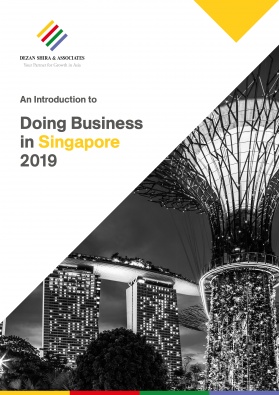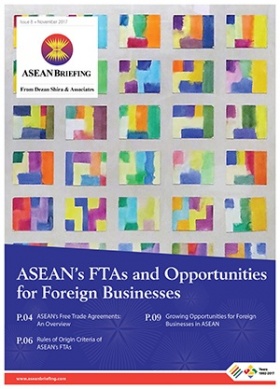Export Procedures in ASEAN
Brunei
Exporters first need to register with the Registry of Companies and Business Names (through the Ministry of Finance) in order to obtain a company registration number. Then, they should register with Brunei’s Royal Customs and Excise Department (RCED). Afterwards, exporters will be able to make an account on the Brunei Darussalam National Single Window – an online portal which streamlines all subsequent submission of documents as well as customs clearance and payments.
Businesses exporting out of Brunei must provide Bill of Lading; Commercial Invoice; Customs Export Declaration; Packing List; Insurance Certificate; Export Permit; and Certificate of Origin.
Cambodia
Exporters first need to register with Cambodia’s Department of Business Registration, under the Ministry of Commerce.
Cambodia uses the Automated System for Customs Data (ASYCUDA) created under the United Nations Conference on Trade and Development (UNCTAD). To register with ASYCUDA, exporters require a Taxpayer Identification Number (TIN). To acquire a TIN, exporters must register with the General Department of Taxation, under the Ministry of Economy and Finance. Finally, exporters must register with the General Department of Customs and Excise. Subsequently, exporters need to register their value added tax (VAT) accounts with the General Department of Taxation (Ministry of Economy and Finance). Exporters operating out of Special Economic Zones (SEZs) must apply with the Free Zone Management Department of the General Department of Customs and Excise in Phnom Penh.Businesses exporting out of Cambodia must provide Customs Export Declaration; Commercial Invoice; Packing List; Road Transport Document (if departing by land); Bill of Lading (if departing by sea); Terminal Handling Receipts (if departing by sea); Insurance Certificate; Export Permit; and Certificate of Origin.
Indonesia
Exporters are required to register with Indonesia’s trade department and obtain a customs identification number (Nomor Identitas Kepabeanan, NIK), a personal identification number given by the Directorate General of Customs and Excise. In addition, exporting companies must already have a taxpayer identification number (NPWP) and one of the following business licenses: Trade license (SIUP) from the Ministry of Trade; Manufacturing license from the Ministry of Industry, or other licenses issued by the relevant authority; PMA license issued by the Investment Coordinating Board (BKPM); or Exporter identification number (APE).
Businesses exporting out of Indonesia must provide Bill of Lading, Airway bill or other transport documents such as postal receipt, cargo receipt; Commercial Invoice; Customs Export Declaration; Packing List; Export declaration of goods (PEB); Insurance Certificate; Export Permit; and Certificate of Origin.
Laos
All exporters must first register with the Ministry of Industry and Commerce’s Department of Enterprise Registration and Management. Not all exported products require a license. To determine the criteria for license requirements, Laos uses three categories based on the product for export. These are:
- Products which do not require a license;
- Products requiring a license under the automatic route; and
- Products requiring a license under the non-automatic route.
Exporters can secure these licenses from the Department of Imports and Exports (DIMEX). Products under the automatic route are licensed for the purpose of collecting statistical information whereas products under the non-automatic route require permission from DIMEX to be exported.
Businesses exporting out of Laos must provide Bill of Lading; Commercial Invoice; Packing list; Road transit document; Export Customs declaration; Copy of tax registration; and Copy of business license.
Malaysia
Not all goods exported from Malaysia require a license. To export goods which require a license, traders first must register with the Companies Commission of Malaysia. Once registered, a company must then apply for an export license from the Ministry of International Trade and Industry (MITI).
When exporting goods out of Malaysia, traders must provide Customs Export or Import Declaration; Commercial Invoice; Bill of Lading; Packing List; and Certificate of Origin
Myanmar
To export goods from Myanmar, a company must register itself with the Directorate of Investment and Company Administration (DICA). Fortunately for overseas companies, the DICA recently created a digital single clearance window for registration called the One Stop Service (OSS). Companies can register themselves with the DICA for up to five years. Once registered with the DICA, a company must then register itself with Myanmar’s Department of Trade (under the Ministry of Commerce). Registrations with the Department of Trade are limited to three year periods and cost Kyat 50,000 (US$36.50) per year. All exporters are also required to join the Myanmar Federation of Chambers of Commerce and Industry.
To export goods from Myanmar, a company must provide an export declaration form called CUSDEC—2 as well as the CUSDEC—4 Customs Valuation Form. Exporters also require to submit Export License; Invoice; Bill of lading; Packing list; Sales contract; Shipping instructions; Letter of credit or general Remittance or Exemption Certificate; Sample of goods; Fumigation certificate (when required); Phytosanitary certificate (when required), and Recommendation from concerned ministry (when required).
Philippines
First time exporters need to register with the Client Profile Registration System (CPRS) through the Philippine Exporters Confederation. The CPRS accreditation must be renewed annually, costs P1000 (US$20) and takes approximately 15 business days. For certain types of exporters, the Philippines requires additional registration. For instance, coffee exporters must register with the Export Marketing Bureau. Exporters operating out of a special economic zone (SEZ) must register with the Philippine Economic Zone Authority (PEZA) while companies exporting out of free port zones must register with the specific free port. Once registered, exporters will receive a Unique Registration Number, necessary for all export activity.
Businesses exporting out of the Philippines must provide Packing List; Invoice; Bill of Lading; Export License; Customs Export Declaration; and Certificate of Origin.
Singapore
All goods exported from Singapore must be declared, though they are not subject to GST and duty. A certificate of origin can be acquired for any exported good created in Singapore through the online TradeNet platform. To begin the export process, the exporter must obtain a Unique Entity Number (UEN) by registering with the Accounting and Corporate Regulatory Authority (ACRA), or another relevant UEN issuance agency, which will allow the exporter to activate its Customs Account. To acquire a customs export permit, exporters may register themselves as a declaring agent or appoint a declaring agent to act on their behalf. Permit applications are submitted online through the TradeNet system.
If stated in the permit conditions or if the cargo being exported is a dutiable good, certain documents must be presented to checkpoint officers at the point of cargo lodgement. In such instances, both containerized cargo and conventional cargo require the approved customs export permit and supporting documents including the invoice, packing list, and the bill of lading or airway bill, in addition to having the permit number at hand.
Thailand
The procedures for exporting goods from Thailand have been centralized into the online e-Customs system. In order to register for the system, the exporter must already possess a ‘digital certificate’. Once a digital certificate is in place, the exporter may proceed to register for the e-Customs system.
Two separate checks need to be made before goods are exported: firstly, to identify if goods require an export permit, and secondly, to ascertain if goods are considered ‘red line'(as opposed to green line). In terms of red line goods, extra documentation is required before the shipment can leave Thailand. These include Invoice; Export License (if required); other relevant documents (e.g. Food and Drug Administration approval, destination information, etc.). Green line goods are clear to proceed.
Vietnam
In order to be able to conduct export business in Vietnam, a foreign investor must register with the Department of Planning and Investment (DPI).
Additionally, foreign investors who wish to engage in export activities in Vietnam are required to obtain an Investment Certificate. Companies that wish to expand their current business operations in order to engage in export activities must follow the procedures for adjusting their Investment Certificates. Certain goods require the trading company to obtain export permits from the government.Companies that export goods must submit a dossier of documents to the customs authorities. The dossier must include at least the company’s business registration certificate and export business code registration certificate. Additional documents that may be requested by authorities depending on the exports in question include Bill of lading; Certificate of origin; Commercial invoice; Customs export declaration form; Packing list; and Technical standard/health certificate.
 This article is an excerpt from the December 2018 issue of ASEAN Briefing magazine, titled “Export and Import Procedures in ASEAN: Best Practices“. In this issue, we highlight the region’s export and import procedures for the benefit of trading businesses. We begin by outlining the export procedures in each ASEAN member state. Next, we focus on import procedures in each ASEAN country. Finally, we discuss the importance of meeting the region’s Rules of Origin (RoO) criteria for exporters and importers looking to take advantage of the individual ASEAN member states’ FTAs as well as the bloc’s regional FTAs.
This article is an excerpt from the December 2018 issue of ASEAN Briefing magazine, titled “Export and Import Procedures in ASEAN: Best Practices“. In this issue, we highlight the region’s export and import procedures for the benefit of trading businesses. We begin by outlining the export procedures in each ASEAN member state. Next, we focus on import procedures in each ASEAN country. Finally, we discuss the importance of meeting the region’s Rules of Origin (RoO) criteria for exporters and importers looking to take advantage of the individual ASEAN member states’ FTAs as well as the bloc’s regional FTAs.
About Us
ASEAN Briefing is produced by Dezan Shira & Associates. The firm assists foreign investors throughout Asia from offices across the world, including in Singapore, Hanoi, Ho Chi Minh City, and Jakarta. Readers may write asia@dezshira.com for more support on doing business in ASEAN.
- Previous Article Investing in ASEAN’s Tea Industry
- Next Article Malaysia’s Investment Outlook for 2019








